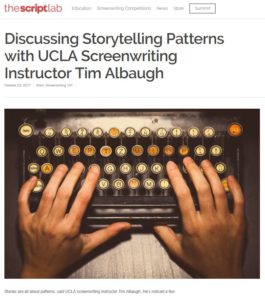 By Valerie Kalfrin
By Valerie Kalfrin
The Script Lab, Oct. 23, 2017
Stories are all about patterns, said UCLA screenwriting instructor Tim Albaugh. He’s noticed a few.
Take the films American Beauty, Mean Girls, In Bruges, Iron Man, Stranger Than Fiction, Up—or other tales that have won a critical or fan following. “They’re all the same movie, told through different characters,” he said.
With a new academic year under way, Albaugh lectures weekly in the professional program in screenwriting for UCLA’s School of Theater, Film and Television. He’s also the director of the graduate screenwriting and film studies program at Hollins University in Roanoke, Va., and a past instructor at Pixar Animation Studios.
When he’s not in the classroom, you might find him at a film festival, glad to share his thoughts on storytelling. (We heard him at the Sunscreen Film Festival earlier this year in St. Petersburg, Fla.) Before teaching, Albaugh wrote the 1997 film Trading Favors starring Rosanna Arquette, as well as uncredited rewrite work for several years. His students have sold scripts to studios and producers including the Coen brothers, HBO, Michael Bay, Showtime, Lifetime, and Mandalay Entertainment.
“You will learn way more from writing shitty movies than from watching good ones,” he said, adding that he’s done his share of those. “I’m really big in Kuala Lumpur.”
On the road, Albaugh can’t dive as deep into structure and characterization as he can in the classroom—but he still provides plenty of food for thought. For instance, if structure is organic to your story, it becomes invisible. “Everything has a beginning, middle, and an end. Even your life. You need structure in your stories because without it, there’s no cohesion,” he said.
Here are five patterns he’s found to produce a memorable screenplay.
1) By pursuing what they want, characters get what they need.
The most compelling characters are larger than life, and they seek out conflict that leads to something unexpected—a common thread in the films mentioned above. “By pursuing what they want, they get what they need,” Albaugh said.
In American Beauty, Lester Burnham (Kevin Spacey) “is larger than life because he does what we all want to do. He tells the world to fuck off,” Albaugh said. By angling to have sex with his teen daughter’s friend (Mena Suvari), a goal he doesn’t achieve, he oddly becomes a better dad.
In School of Rock, musician Dewey Finn (Jack Black) starts off as a jerk, to the point that when he jumps into the mosh pit, no one catches him. He impersonates his roommate to become a substitute teacher for money, then finds purpose and connection with his students—and toward the end of the film, when he leaps, he’s kept aloft.
The Sixth Sense is all about communication, Albaugh said. Psychiatrist Malcolm Crowe (Bruce Willis) wants to heal the child (Haley Joel Osment) who sees ghosts. But he needs to communicate with his wife.
2) The beginning of the movie is the promise of the end.
Raiders of the Lost Ark introduces heroic archaeologist Indiana Jones (Harrison Ford) doing what he does best, Albaugh said. He’s resourceful but not perfect. He’s trusting—remember how he throws the man the golden idol in exchange for the whip as the temple falls apart in the opening minutes?
“The beginning of the movie is the promise of the end,” Albaugh says—in this case, one teased when rival archaeologist Belloq (Paul Freeman) says a few seconds later: “Dr. Jones. Again, we see there is nothing you can possess which I cannot take away.”
Want more promise? The film establishes a bit later that Indy is afraid of snakes and Marion (Karen Allen), his old love, Albaugh said. It’s no coincidence that at the midpoint, he’s in a pit with snakes and Marion—with Belloq gloating over him.
3) Movies are about watching people become something, not be something.
All movies are about relationships with the potential for change, which is why static characters are boring, Albaugh said. “Movies are about watching people become something, not be something.”
Your plot’s goal should be the most difficult thing your character ever does—so push him or her into uncomfortable places. “You have to become a psychologist and an instigator for your character.” Write an online dating profile for your character, then team him or her up with the least likely person.
Marlin (voiced by Albert Brooks), the overbearing, overprotective papa clownfish in Finding Nemo, worries about what can go wrong because he can’t forget everything that has, he said. Dory (voiced by Ellen DeGeneres), a persistently friendly blue tang, is the best companion for him because she “can’t remember five seconds ago.”
4) Villains are the heroes of their own stories.
That advice works just as well for your antagonist, Albaugh said. “Villains are the heroes of their own stories.” It’s important for an audience to see not just what your character does but how they affect the people around them.
All the characters in Up, for instance, need to let go of the past. Widower Carl (voiced by Ed Asner) is literally tethered to his house full of memories, buoyed by balloons. The film’s villain fails because he ultimately can’t let go, he said.
5) Write what you feel.
Writers often hear to write what they know—but your heart should be your guide. “Don’t write what you know. As interesting as you think your life is, it’s not a movie. Write what you feel,” Albaugh said. “Ultimately, what gets you excited about a movie is how you feel when you leave.”
Original link: https://thescriptlab.com/features/main/7688-interview-discussing-storytelling-patterns/

